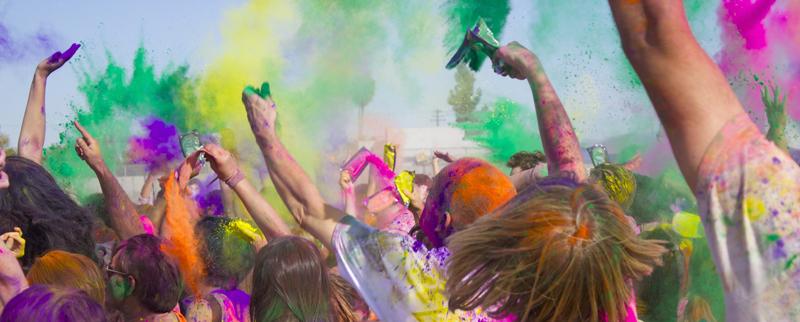In spirit of the “Holi” celebration, strangers hugged and danced on the Excelsior high school grounds in Norwalk Saturday as the sweet scent of powder clouded the air.
The literal meaning of the Indian word “Holi” is burning.
According to ancient Indian tradition, the festival was originally known as “Holika,” named after the sister of an egotistic demon king who was angered that his son, Prahlad, refused to worship him. After many attempts to kill the child, who was protected by the benevolent Lord Vishnu, the demon king enticed his sister to step into fire with the child as he knew that she was impervious to the flames. When she entered, she perished because her powers were used for evil, while Prahlad was left unscathed.
According to holifestival.org, The Holi festival celebrates the perishing of Holika by burning her ashes and rejoicing in good by throwing colors, which are representative of spring and the playfulness of the benevolent gods.
The festival is generally celebrated at the end of February or the beginning of March, but festivities will be held in other southern California locations through June.
To Indians, Holi has cultural, social and even biological significance. People sing loudly, hug and dance while their skin absorbs the powder that is believed to strengthen the ions in the body and penetrate the pores, while people overcome differences to come together and enjoy the day.
Mischevious children threw colors in eyes and on cameras, lost in the joyous moment. Customarily, the culprit’s reply would be simply: “Buran a mano, Holi Hai,” meaning, “Don’t get offended, it’s Holi!”
While attendees weren’t singing traditional Indian songs as they do in the festival’s country of origin, dub step artists, devotional rock bands and variations of kirtan music, or music based on religious chants, was performed. Merrymakers let loose and danced to their own beat, infusing styles of belly dance, Bollywood, yoga and even electronic.
People danced in front of the main stage as Larisa Stow and the Shakti Tribe played Kirtan music and led chants of the universal mantra “Hare Krishna.”
Rather than encouraging partying and drug use, performers encouraged festivalgoers to be sober, staying intoxicated in the moment by the cloudy air and the vibrant energy of others.
“If you smoked something, or drank something, before you came here today, you’re not having as much fun as we are,” the announcer said.
In traditional belief, the intoxication that comes from celebration and social interaction is meant to be natural, as merrymakers are overjoyed by the coming of spring and the transcendence of the social divide.




